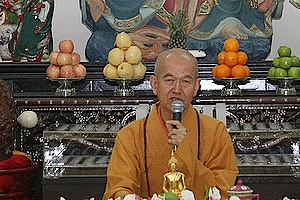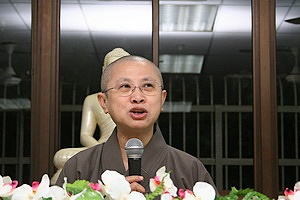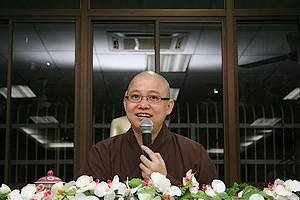Submitted by Ah Jin on

A series of Dharma talks spread over three nights consecutively was held in Than Hsiang Temple in conjunction with the annual Mahasanghikadana organized by the Malaysian Buddhist Sangha Association. The speakers were: Ven. Zhi Teng , Ven. Zhi Zunand Ven. Boon Kean with the following topics:“snow view”, “the choices on the path of cultivation” and “the Fouthfold Noble Path” respectively.
The first lecture entitled “snow view” referred to the cultivating of pure and wholesome thought resembling the quality of snow’s spotless whiteness and secondly, the coldness of the snow to freeze our defilements.
Ven. Zhi Teng further said that in this age of information technology when one can easily access with a wide array of information, one should use one’s wisdom to distinguish the right views from the wrong views, just like seeing a crystal-clear icy snow.
Lastly, she advised that there are various ways to rid of defilements. Besides gaining faith through seeking refuge in the triple Gem, one should participate in voluntary social works, and learn the virtues of others especially our spiritual friends.
She reminded also that while interacting with fellow brothers and sisters in the dharma, one should learn not to always impose on others to avoid excessive demand and misunderstanding.
On the topic of “choices on the path of cultivation”, Ven Zhi Zun reiterated the importance of making the right choice in the selection of the Buddha teachings in order to establish the right views. In particular, the recognition of the universal characteristic of suffering will help a practitioner appreciate the intention of the Buddha in showing the path of alleviating our predicament. The aim of enlightenment is a noble one, involving our undivided commitment to inculcate detachment and compassion, she added.
Ven. Boon Kean expounded the central concept of suffering which form of the famed Fourfold Noble truth. Suffering classified into physical and mental aspects. Physical sufferings refer to the cycle of birth, aging, sickness and dying ; while mental suffering take the form of , not getting what one desire; care ,distress, pain, affliction and despair are all suffering; in short the five aggregates connected with attachment are suffering. Therefore, our attachment to form, sound, smell, taste, feeling and mental objects are the root cause of our suffering. In another word, we long for what appeal to our senses and averse to what are repugnant to our senses. The only way to free ourselves is detachment or popularly expressed as letting go.
He further emphasized the core teaching of Buddhism of freeing oneself from attachment, be mindful of the present; the past is over and gone with while the future has yet to come. Therefore, only through purifying our mind at the present hold the key for our liberation.
The three dharma lectures, though varied in subject matters, are presented in a very interesting and simplified manner to enable audience to grasp the true teachings of the Buddha.



